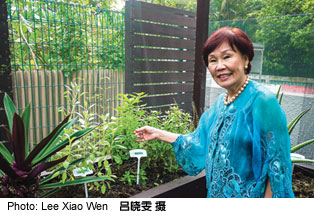 One lazy afternoon we drove up to a quiet place along Stevens Road and walked into a house with an obviously well-tended garden. Mrs Lim met us at the door and welcomed us like old friends. She would later whisper conspiratorially to me, "Oh, I love the garden. I plant all kinds of herbs - and my favourite is the basil!"
One lazy afternoon we drove up to a quiet place along Stevens Road and walked into a house with an obviously well-tended garden. Mrs Lim met us at the door and welcomed us like old friends. She would later whisper conspiratorially to me, "Oh, I love the garden. I plant all kinds of herbs - and my favourite is the basil!"
Mrs Lim is perhaps best known for her role as the principal of Raffles Girls' School (RGS), a position she held from 1988 to 1999. Post retirement, she has, amongst many other things, picked up oil painting, received her Master's in Early Childhood Education, published three books and founded two early childhood companies.
The energetic retiree - a misnomer if there ever was one - tells us about her days at RGS and the things she has been keeping herself busy with post retirement.
Her Request to Head RGS
Mrs Lim earned her Bachelor's degree in Chemistry and Pure Mathematics from what was then the University of Singapore on a teaching scholarship, and started teaching in Crescent Girls' School immediately after graduation. She later taught in RGS (1969-1977) and went on to be the principal of Woodsville Secondary (1977-1983) before joining the Ministry of Education as an Inspector of Schools. When she heard that Mrs Chee, then principal of RGS, was retiring, Mrs Lim asked to head the School - a request that the Education Minister at the time, Dr Tony Tan, was happy to approve.
As an old girl of RGS herself, Mrs Lim felt that she ought to give back to her alma mater in whatever way she could. "RGS always had exceptional students - all supposed to be high fliers. I just wanted to broaden the programmes RGS offered to give the students more opportunities to explore areas in the arts, sports and social work," revealed Mrs Lim.
"I think I fulfilled what I set out to do during my 12 years with RGS. Many of my students went on to study abroad, for example, and volunteered to do community service in under developed countries around the world. I know this because some of them came back to seek funding to continue doing community service in places like the remote parts of Africa during their university years."
During her tenure several alumnae chose not to follow the traditional academic route after leaving RGS and instead made names for themselves on the local music scene: singers like Kit Chan, Stefanie Sun and Corrinne May, as well as performing artistes like Emma Yong, who just passed away in 2012, Rani Singam, a successful jazz singer, and keyboardist Ruth Ling. In that sense, RGS has indeed flourished in the arts since Mrs Lim's tenure as principal.
Avant-garde Changes
Under Mrs Lim's leadership RGS became independent in 1993. The autonomy gave the School free rein to implement many of the ideas that had been percolating through her mind.
The first thing she did, prior to independence, was to organise an in-house workshop for all the staff to decide where they wanted the School to go and what they wanted the School to be. The sense of ownership this gave to those who were going to implement any changes was a powerful tool in their success.
The shared vision that they came up with was that every RGS girl should aspire, strive and dare to be an active agent of change in the world and that she should use her talents and gifts to make it a better place for us all. The School's mission statement was accordingly crafted to reflect this commitment to developing the whole student and her desire to give back to society. And the values that they singled out were the four Ps - people-centred, passionate, principled and professional.
Because the School was looking at new approaches they had to have the parents, the students and the teachers sharing a common vision, and that was not easy. "Changing mindsets was the toughest of all," said Mrs Lim. "For instance, when I declared that there would be no mid-year examinations, many opposed the idea. Even the students wanted these examinations."
Mrs Lim implemented other novel changes, too - one of which being the eight-day timetable. The benefit of this was that it would help to minimise the interruptions caused by public holidays to the students' work schedule. The cost, however, was the counter-intuitive nature of the new system and the consequent difficulties that both the girls and their teachers experienced when they tried to follow it. Sadly, it was therefore dropped.
Mrs Lim also suggested having subject homerooms instead of classrooms, so that each homeroom could be decorated with objects related to that subject. She felt this was important because she firmly believes that one's surroundings influence one's learning. Of course, the price was a little inconvenience as students had to keep moving for their lessons.
Another of Mrs Lim's suggestions was to combine history and geography and integrate them both into the social science curriculum. She did this because she believes that history, geography and economics are intimately related. Initially, the affected subject teachers were resistant to the idea but within a year they independently voted to make the proposed change themselves.
"I always felt that once RGS became independent, we had a lot of leeway to attempt new things. If they didn't work out, it didn't matter. It would have been a valuable experience," explained Mrs Lim.
Brain Research
 "I first turned to brain research because I was concerned that some of the girls were not coping in the upper secondary levels and their grades were deteriorating as a result. I wondered about the reasons why they weren't doing well, and thought that it might be because we weren't teaching to their respective learning styles. I therefore started looking into brain research and how it can be applied to teaching and learning. This was how I came to develop an interest in brain development in early childhood." "I first turned to brain research because I was concerned that some of the girls were not coping in the upper secondary levels and their grades were deteriorating as a result. I wondered about the reasons why they weren't doing well, and thought that it might be because we weren't teaching to their respective learning styles. I therefore started looking into brain research and how it can be applied to teaching and learning. This was how I came to develop an interest in brain development in early childhood."
Mrs Lim firmly believes that all students can learn - it is just a matter of finding out how they learn. Our brains have 100 billion neurons and our bodies have seven senses - the usual five plus the vestibular (for movement and balance) and the proprioceptive (which oversees the brain-muscle feedback loop). The secret of learning, she believes, is to use as many of these senses as possible in order to get the neurons to fire and wire up.
When she was Principal of Woodsville Secondary School she volunteered to teach Science to a class of Normal (Academic) students. Thinking hard about how best to do this she hit on the idea of using soccer as a way of demonstrating Newtonian mechanics.
"A good teacher is one who knows how to engage her students, and who can inspire them to get excited about learning," she said. "In a nutshell, Every Child Can Learn - it's about getting the brain to wire up. Once you get them excited about learning, their neurons will wire up."
Multi-sensory Early Childhood Programmes
After Mrs Lim retired, she started two companies - Jumpstart Kidsports Pte Ltd in 2000 and Aoede Music? Enterprise in 2006 - because she has always been a passionate advocate for music, movement and gymnastics for children. Current research shows that such activities contribute significantly not only to cognitive, social and emotional development, but they also improve self-esteem.
"The capacity of the infant brain to absorb new learning is phenomenal. Appropriate early childhood programmes not only help the child's brain develop in a timely fashion, they also contribute to physical, emotional and social development. Therefore we should expose young children to as many experiences as possible. The more they are stimulated, the better they are able to learn the appropriate responses," Mrs Lim said.
Jumpstart Kidsports offersa multi-sensory KidzGym programme for pre-school children while Aoede Music? aims to give children the "Gift of music for a Lifetime" by integrating music with technology to make music-making fun and enjoyable. Aoede Music? is a two-year programme currently available at PAP kindergartens. There are four main areas of instruction - vocal, instrumental, rhythm and musical ensembles, and composition.
In addition to her role as founder and chief education officer of both companies, Mrs Lim is also Mentor Principal at MindChamps, a mind development institute that trains and helps students learn better. In this role she runs courses in brain development and child psychology as part of the 200 hours of training that all the teachers from MindChamps have to undergo regardless of their qualifications.
Pre-school Rankings and Statutory Board
According to a report by the Economist Intelligence Unit to benchmark early education across the world, commissioned by the Lien Foundation in 2012, Singapore was placed 29th out of 45 countries, and Mrs Lim was not surprised.
"There is a huge disparity in terms of the quality of teachers across our kindergartens - school fees also range from a few hundred to thousands of dollars," she explained.
Mrs Lim elaborated on her concern about the quality of our pre-school teachers. "The government must really step up on their training and get more people excited about being a part of early childhood education," she said. In the meantime she suggested that the newly created statutory board for pre-school education could look into recruiting teachers who love children, or are good in music, sports or art. "These individuals can be trained to become specialists, even though they don't have the minimum requirement of five O level passes. They could then be given opportunities to upgrade their skills, training and qualifications."
Mrs Lim was certainly excited about the 2012 National Day rally announcement. "Early childhood encompasses the first eight years of everybody's life. Quality education in the early years has lasting effects on learning and motivation so I hope the new statutory board will look into not just the pre-school programme up to the age of six but also the Primary 1 and 2 curriculum as an extension of the early childhood programme."
Parenting and Teaching Advice
When asked what advice she would like to give to parents and educators, Mrs Lim said, "As parents we must recognise the uniqueness of each child, because every child is different- and we must be creative in coming up with strategies to nurture that child."
"As educators, one of the most rewarding affirmations is to know that we have made a positive difference in every student's life. In the book Journey of the Heart: The Call toTeaching, E. Grady Bogue shares these thoughts on making a difference: 'Teachers are people who know the quiet but potent power of compassion, who know a moment of caring can turn a life to a new path, who know that beyond love the next most enriching human emotion is the excitement and touch of wonder that comes with learning.'"
|